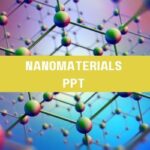Smart materials are advanced materials that respond to external stimuli such as temperature, pressure, light, or electric fields by changing their properties. These materials are designed to adapt to their environment, making them useful in a wide range of applications. Unlike traditional materials, smart materials are dynamic and capable of self-regulation, offering innovative solutions across industries.
Also See: Applications of Nanomaterials PPT
Smart Materials PPT: Meaning, Types, Applications, Advantages
Contents
Types of Smart Materials
Smart materials come in various forms, each with unique characteristics:
- Shape Memory Alloys (SMAs): These metals return to their original shape when heated.
- Piezoelectric Materials: Generate electricity when mechanical stress is applied.
- Thermochromic Materials: Change color with temperature variations.
- Electrochromic Materials: Alter transparency or color in response to electric fields.
- Magnetorheological and Electrorheological Fluids: Change viscosity under magnetic or electric fields.
Also See: Nanomaterials PPT
Applications of Smart Materials
- Healthcare: Smart materials are used in medical devices, drug delivery systems, and implants. Shape memory alloys are used in stents and orthodontic braces.
- Construction: These materials improve building safety and energy efficiency. For example, thermochromic glass regulates indoor temperatures by changing its transparency.
- Aerospace: Smart materials are employed in aircraft for vibration control and self-healing structures.
- Consumer Electronics: Used in responsive displays, sensors, and wearable technology.
- Automotive: Adaptive suspension systems and self-repairing coatings rely on smart materials.
Advantages of Smart Materials
Smart materials offer numerous benefits, such as improved efficiency, adaptability, and durability. They reduce the need for external controls and can significantly enhance the performance of products. Their ability to respond autonomously to environmental changes makes them highly versatile and valuable in modern technology.
Also See: Chemistry in Everyday Life PPT
Table of Content for Smart Materials PPT
- Introduction
- Operation principle
- Types of SMA
- Economical Outlook
- Applications
- Advantages
- Conclusion
Free Download Link



